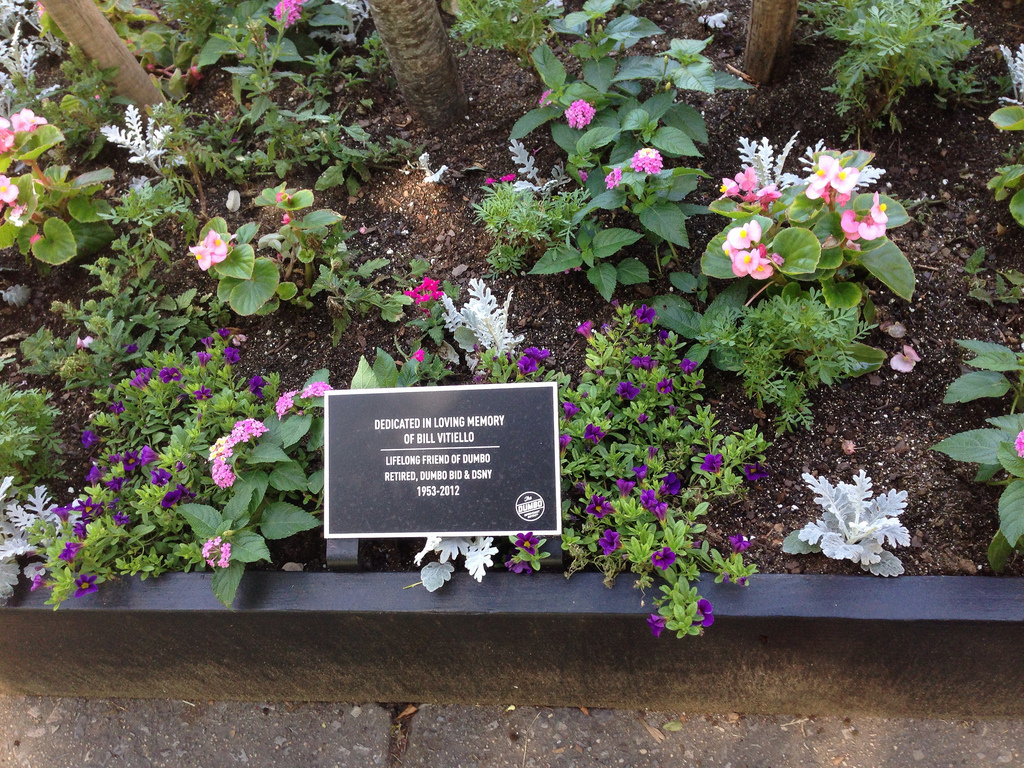
On DUMBO’s Washington Street there is a recently-planted tree. In a planter surrounded by flowers, it makes the street a little brighter while remaining unassuming. It’s a fitting memorial for the kindhearted, no-nonsense and modest man who worked to better the neighborhood for over two decades.
Bill Vitiello spent more than half of his working life bettering DUMBO and the surrounding neighborhoods of Brooklyn Heights and Vinegar Hill, first at the Department of Sanitation and later at the DUMBO Business Improvement District. Over two decades, Vitiello’s devotion and tireless work was instrumental in transforming DUMBO’s streets into what they are today.
“DUMBO for a long time was off the radar for city services and there wasn’t necessarily a lot of pride put in what our streets looked liked,” said Alexandria Sica, executive director of the DUMBO BID. Vitiello, Sica said, was instrumental in getting the neighborhoods’ cobblestone streets “shined up and ready for primetime.”
Though Vitiello spent countless hours walking DUMBO’s streets looking for ways to improve this little section of Brooklyn, he was from Staten Island. Vitiello was born on June 10, 1953 in Great Kills, where he lived his entire life. When he was younger, he worked for his father, Vito Vitiello, at his car repair shop. Though Vito and Bill used to argue – especially over the strict 10 p.m. curfew, his brother Jim Vitiello recalled – they later became very close.
In 1985, Vitiello was offered a job with DSNY. He was initially reluctant to take the position because he did not want to abandon his dad. He only accepted after his father told him to, saying that it would be a good, stable future. Jim Vitiello, the younger brother by 2 years, thought Bill probably wouldn’t have left without that encouragement.
This loyalty was one of Bill Vitiello’s defining characteristics.
“He had and kept friendships from basically childhood,” Jim Vitiello explained.
Vitiello, who never married, similarly remained close with people he had gotten to know while working for the DSNY and later the DUMBO BID. One of those people was Judy Stanton, executive director of the Brooklyn Heights Association, who worked with Vitiello when he was with Sanitation. After he left the agency and was no longer working with her, Vitiello was still more than happy to offer expert advice on how to plow snowed-in streets or just to have a friendly chat.
“There were just a few city workers that I’ve gotten attached to, and Billy was one of the best,” Stanton said.
During his early years with the Sanitation Department, Vitiello was a garbage man. He enjoyed the work and the people he met on the streets. Jane Kojima, who worked at the BID with Vitiello, recalled that he had plenty of “crazy sanitation stories.”
Vitiello interacted with Brooklyn’s rich and its poor, picking up trash from all sorts of communities in the odd hours of the day. He had seen both sides of the city in his personal life as well. He grew up as one of six kids on their father’s mechanics salary, and times were often tight. By the time he was promoted to supervisor with the DSNY, though, he was living comfortably with a stable career.
This experience kept him mindful of Brooklynites of all walks of life. While with the BID he organized an annual book-a-thon promoting reading among fifth graders at PS 307, located across the street from the Farragut Housing Projects. As a reward for reading a certain number of books, the class took a trip to Yankee Stadium. Vitiello realized that some of these kids had never been to a ball game, and he wanted to give them that opportunity. He wanted to share the benefits of a well-to-do neighborhood like DUMBO with residents of the poorer Farragut Houses.
His mother, Margret Rose Vitiello, used to tell her kids to “treat everybody the way we want them to treat us,” Jim Vitiello said. “And that’s the way we were raised, and that’s how Billy treated everyone else.”
While with the DSNY, Vitiello helped draw attention to DUMBO and its neighbors. As recently as a few decades ago DUMBO was mostly forgotten industrial ghost town. Vitiello helped clean up the streets, first with his own hands as a garbage man, and then through policy and planning as the supervisor.
Vitiello left the Sanitation Department after suffering a stroke and was invited to work part-time for the DUMBO BID in 2006. It was a nice change of pace and easier on his health, and he continued his work improving DUMBO’s infrastructure.
While with the BID, Vitiello would come in early and meet with the street cleaning team from the Doe Fund each day. The Doe Fund provides homeless individuals with housing and paid, low-level, “transitional work,” such as street cleaning, according to their website. Vitiello helped organize DUMBO’s team, and developed close, personal relationships with many team members.
“He worked with them like a manager for the team rather than a contractor,” Kojima said.
He spent a lot of his day simply patrolling DUMBO’s streets, looking for things that needed to be fixed or could use improvement.
“Walking around with the classic Bill Vitiello looking glass to see if anything was awry,” Sica recalled.
Vitiello loved the job, but was forced to retire when he underwent a double bypass operation two years before his death. It didn’t go well. Wires in his sternum didn’t hold, and after a second, unsuccessful operation to repair the damage, he was left with chronic, serious chest pains.
At first, he was looking forward to relaxing, but soon began to miss work.
“He said physically if he could have gone back to work for the BID, he would have,” Jim Vitiello said.
In April 2012, after five hospital visits, he was diagnosed with stage 4 appendix cancer. Though he appeared to be doing fairly well, with Kojima often attending chemotherapy sessions with him, things took a turn for the worse. Vitiello passed away in November, less than half a year after the diagnosis. He was 59 years old.
There were no big funerals or obituaries for Vitiello. He had told his family that he didn’t want them, because the last thing he wanted was for everyone to stand around feeling sad, his brother said.
Still, in July, the DUMBO BID honored Vitiello by planting a tree in his memory. Kojima even helped Sica and Chris Martin, the BID’s Director of Operations & Community Development, to organize the ceremony, despite having left in 2012 to go work for the Flatiron BID in Manhattan. Roughly 30 people, including friends, local business owners and former coworkers at the DSNY, came out to pay their respects to Vitiello.
“What would you define as successful in life?” Jim Vitiello asked. “A lot of the time people define success as being wealthy or having a powerful position. Bill never got that, but in a certain way he impacted more people.
“I don’t think many people would have gotten the turnout that he got. The friendships he had.”
Originally Published on DUMBO NYC on November 11, 2013
